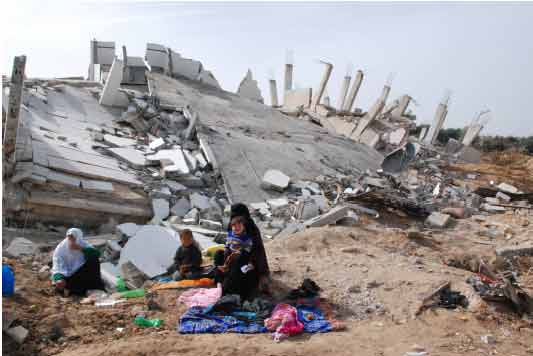Rebuilding Gaza: putting people before politics – An Oxfam Report
Embargoed until 00.01 on 2nd June 2009
In June 2009 the blockade on the Gaza Strip enters its third year. The intense closure policy, coupled with the government of Israel’s recent military operation ‘Cast Lead’, has had a devastating impact on the lives and livelihoods of one and a half million Gazans, pushing them further into poverty and aid dependency. Parties to the conflict and the international community have, to varying degrees, prioritised their own political objectives over people’s rights and needs, leaving Gazans sitting on the ruins of their homes. By attempting to isolate Hamas, the government of Israel and key international donor governments and institutions have in fact isolated the people of Gaza, thereby reducing chances of securing a peaceful, just and durable resolution to the Israeli-Palestinian conflict. The status quo cannot be allowed to persist. Israeli, Palestinian and world leaders must abide by their respective legal obligations to take concrete actions to end the collective punishment of Gazan civilians by securing the full and immediate opening of all the Gaza crossings.
Here are the Report’s Conclusion and recommendations
Several Oxfam partners and beneficiaries in Gaza have warned that money pledged at Sharm al-Sheikh raises expectations which look set to be disappointed once again if no change is delivered, thereby fuelling further frustration and resentment. In September 2008, aid agencies – including Oxfam – warned that the international strategy on Gaza was failing at all levels.25 Eight months on, Gazans find themselves exhausted by 23 months of blockade and three weeks of intense conflict and more aid dependent. They are even further from having their fundamental right to live a normal and dignified life fulfilled.
Without concrete action to address the underlying political factors, no amount of money or elegance of mechanisms to channel funds can bring about the desperately needed improvements to the lives of Gazan children, women and men. The key to achieving such progress is an end to the blockade and a beginning to rebuilding Gaza.
It is difficult to see how a viable Palestinian state can be achieved without Gaza. Instead of easing movement restrictions, over the past years, restrictions on movement have been increased. Unless donors chose to act on Gaza, change cannot reasonably be expected in the West Bank.
To the government of Israel:
Fully lift the blockade on Gaza, in line with its international legal obligations:
– Operate all crossings at maximum capacity (7 days per week), with particular emphasis on Karni (as the crossing with the largest capacity) and Nahal Oz (through which all fuel is channeled including industrial fuel for the Gaza power plant).
– Allow unrestricted access for all goods and people into and out of Gaza, with particular priority for those who seek medical treatments unavailable in the Gaza Strip;study in the West Bank, East Jerusalem or abroad; and assist humanitarian aid delivery.
Cease military incursions into Gaza.
To Palestinian actors:
– Immediately end rocket and mortar attacks into Israel.
– End interference in and attempts to control the delivery of international assistance.
– Ensure a speedy agreement on reconciliation is reached in the short-term with a view to facilitating aid delivery and follow this by intensive talks to reach a long-term resolution.
– Put the short and long-term interests and welfare of the Palestinian people at the centre of their actions.
To the international community:
1. Adhere to its international legal obligations to secure an end to the blockade, in particular by using the tools at its disposal to exert pressure on the government of Israel:
– The UN Security Council should seek an enforcement resolution for breaches by the parties of UNSC Resolution 1860, most especially to deliver the opening of the crossings.
– Governments should endorse the UN Humanitarian Country Team’s May 2009 ‘Framework for the Provision of Humanitarian Assistance in Gaza’ and agree on a means to monitor its implementation.
– The EU should formally suspend the EU-Israel upgrade process until the government of Israel lifts the blockade, by allowing access to and from Gaza for humanitarian and commercial goods, and for people; this could include postponing both the forthcoming EU-Israel Association Council meeting and the adoption of a new EU-Israel Action Plan.
– Donors must also start holding the government of Israel – and when applicable Palestinian armed groups – responsible for the destruction of and damage to their aid projects, not least to deter repetition of destruction of reconstruction and development efforts in the future.
– Donors should urge the UN to set up a comprehensive register of damages of the destruction to civilian lives and infrastructure on both sides of the border, and provide political and financial backing for such an initiative.
– Individual donors should create public inventories of all aid projects they have funded that were damaged, destroyed, delayed and/or suspended; they should hold the government of Israel and Palestinian armed groups fully accountable for any and all damage to and destruction of aid projects and demand full responsibility; and seek to receive an explanation and to recover costs for damaged aid projects.
2. Cease putting ‘political conditions’ on the delivery of assistance for the reconstruction of Gaza.
– Donor should assess and seek a legal opinion as to whether their aid schemes contravene their obligations as state parties to the Geneva Conventions, or in case of EU Member States Community Law, by placing political conditions on the delivery of assistance.
– Donor governments should resume full development aid for Gaza by supporting long-term sustainable funding, and not only emergency short-term funding.

